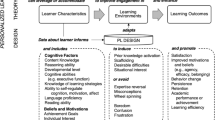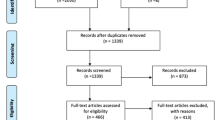Abstract
To evaluate current online parent education resources for children returning to school after a cancer diagnosis. Online search was conducted using 3 search engines and terms recommended by affected families. Sites were evaluated by 3 reviewers for understandability and actionability (scored 0–100%) using the Patient Education Materials Assessment Tool (PEMAT). Readability was assessed using Flesch-Kincaid (grade K-12) and content comprehensiveness by a clinical expert review for 5 late effect domains (scored 0–100%). A total of 56 unique online resources were evaluated. Mean understandability and actionability scores were 54% (range 17–83) and 36% (range 0–83) respectively. The mean Flesch-Kincaid grade level was 10th grade (mode 12th). Comprehensiveness of domain coverage was 34% (mode 20%). Some high-quality materials for this topic are available, but generally low scores on the PEMAT scales and high reading level estimates on Flesch-Kincaid indicate parents may have difficulty understanding and using the information. The low scores for comprehensiveness of information indicate parents will likely need to access multiple sources for complete information. A table provides the names, website (URL), and scoring for the 24 top-rated sites and can be used to make recommendations to parents with improved confidence in quality.


Similar content being viewed by others
References
Hesse BW, Greenberg AJ, Rutten LJ (2016) The role of internet resources in clinical oncology: promises and challenges. Nat Rev Clin Oncol 13(12):767–776
Pehora C, Gajaria N, Stoute M, Fracassa S, Serebale-O’Sullivan R, Matava CT (2015) Are parents getting it right? A survey of parents’ internet use for children’s health care information. Interact J Med Res 4(2):e12
Nicholl H, Tracey C, Begley T, King C, Lynch AM (2017) Internet use by parents of children with rare conditions: findings from a study on parents’ Web information needs. J Med Internet Res 19(2):e51
Gage-Bouchard EA, LaValley S, Mollica M, Beaupin LK (2017) Cancer communication on social media: examining how cancer caregivers use Facebook for cancer-related communication. Cancer Nurs 40(4):332–338
Kilicarslan-Toruner E, Akgun-Citak E (2013) Information-seeking behaviours and decision-making process of parents of children with cancer. Eur J Oncol Nurs 17(2):176–183
Barrera M, Shaw AK, Speechley KN, Maunsell E, Pogany L (2005) Educational and social late effects of childhood cancer and related clinical, personal, and familial characteristics. Cancer 104(8):1751–1760
French AE, Tsangaris E, Barrera M, Guger S, Brown R, Urbach S, Stephens D, Nathan PC (2013) School attendance in childhood cancer survivors and their siblings. J Pediatr 162(1):160–165
Tsimicalis A, Genest L, Stevens B, Ungar WJ, Barr R (2018) The impact of a childhood cancer diagnosis on the children and siblings’ school attendance, performance, and activities: a qualitative descriptive study. J Pediatr Oncol Nurs 35(2):118–131
Yilmaz MC, Sari HY, Cetingul N, Kantar M, Erermis S, Aksoylar S (2014) Determination of school-related problems in children treated for cancer. J Sch Nurs 30(5):376–384
Ruble K, Pare-Blagoev J, Cooper S, Martin A, Jacobson LA (2019) Parent perspectives on oncology team communication regarding neurocognitive impacts of cancer therapy and school reentry. Pediatr Blood Cancer 66(1):e27427
Gage EA, Panagakis C (2012) The devil you know: parents seeking information online for paediatric cancer. Sociol Health Illn 34(3):444–458
Dominguez M, Sapina L (2015) Pediatric cancer and the internet: exploring the gap in doctor-parents communication. J Cancer Educ 30(1):145–151
Shoemaker SJ, Wolf MS, Brach C (2014) Development of the Patient Education Materials Assessment Tool (PEMAT): a new measure of understandability and actionability for print and audiovisual patient information. Patient Educ Couns 96(3):395–403
Shoemaker SJ, Wolf MS, Brach C (2013) The Patient Education Materials Assessment Tool (PEMAT) and user’s guide. (Prepared by Abt Associates, Inc. under Contract No. HHSA290200900012I, TO 4), Agency for Healthcare Research and Quality, Rockville AHRQ Publication No. 14-0002-EF
Kutner GE, MA JY, Paulsen C (2006) The health literacy of America’s adults: results from the 2003 National Assessment of Adult Literacy. US Dept of Education, National Center for Education Statistics, Washington DC
Paasche-Orlow MK, Taylor HA, Brancati FL (2003) Readability standards for informed-consent forms as compared with actual readability. N Engl J Med 348(8):721–726
Safeer RS, Keenan J (2005) Health literacy: the gap between physicians and patients. Am Fam Physician 72(3):463–468
Shoemaker SJ, Wolf MS, Brach C (2014) The Patient Education Materials Assessment Tool (PEMAT) user’s guide. In: A.f.H.C.R.a. Quality (ed)
Mitby PA, Robison LL, Whitton JA, Zevon MA, Gibbs IC, Tersak JM, Meadows AT, Stovall M, Zeltzer LK, Mertens AC, Childhood Cancer C (2003) Survivor study steering, utilization of special education services and educational attainment among long-term survivors of childhood cancer: a report from the Childhood Cancer Survivor Study. Cancer 97(4):1115–1126
Burke M (2013) Improving parental involvement: training special education advocates. J Disabil Policy Stud 23(4):225–234
Finnie RK, Felder TM, Linder SK, Mullen PD (2010) Beyond reading level: a systematic review of the suitability of cancer education print and Web-based materials. J Cancer Educ 25(4):497–505
Amante DJ, Hogan TP, Pagoto SL, English TM, Lapane KL (2015) Access to care and use of the internet to search for health information: results from the US National Health Interview Survey. J Med Internet Res 17(4):e106
Rodgers CC, Laing CM, Herring RA, Tena N, Leonardelli A, Hockenberry M, Hendricks-Ferguson V (2016) Understanding effective delivery of patient and family education in pediatric OncologyA systematic review from the Children’s Oncology Group [formula: see text]. J Pediatr Oncol Nurs 33(6):432–446
Withycombe JS, Andam-Mejia R, Dwyer A, Slaven A, Windt K, Landier W (2016) A comprehensive survey of institutional patient/family educational practices for newly diagnosed pediatric oncology patients. J Pediatr Oncol Nurs 33(6):414–421
Annett RD, Patel SK, Phipps S (2015) Monitoring and assessment of neuropsychological outcomes as a standard of care in pediatric oncology. Pediatr Blood Cancer 62(Suppl 5):S460–S513
O.o.D.S. National Institutes of Health (2011) How to evaluate health information on the internet: questions and answers. https://ods.od.nih.gov/Health_Information/How_To_Evaluate_Health_Information_on_the_Internet_Questions_and_Answers.aspx. Accessed April 2019
Author information
Authors and Affiliations
Corresponding author
Ethics declarations
All persons who meet authorship criteria are listed as authors, and all authors certify that they have participated sufficiently in the work to take public responsibility for the content, including participation in the concept, design, analysis, writing, or revision of the manuscript. Furthermore, each author certifies that this material or similar material has not been and will not be submitted to or published in any other publication.
Conflict of Interest
The authors declare that they have no conflict of interest.
Additional information
Publisher’s Note
Springer Nature remains neutral with regard to jurisdictional claims in published maps and institutional affiliations.
Rights and permissions
About this article
Cite this article
Ruble, K.J., Paré-Blagoev, E.J., Cooper, S.L. et al. Assessment of Online Resources for Returning to School During and After Treatment of Childhood Cancer. J Canc Educ 35, 876–884 (2020). https://doi.org/10.1007/s13187-019-01537-y
Published:
Issue Date:
DOI: https://doi.org/10.1007/s13187-019-01537-y




